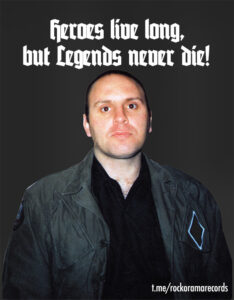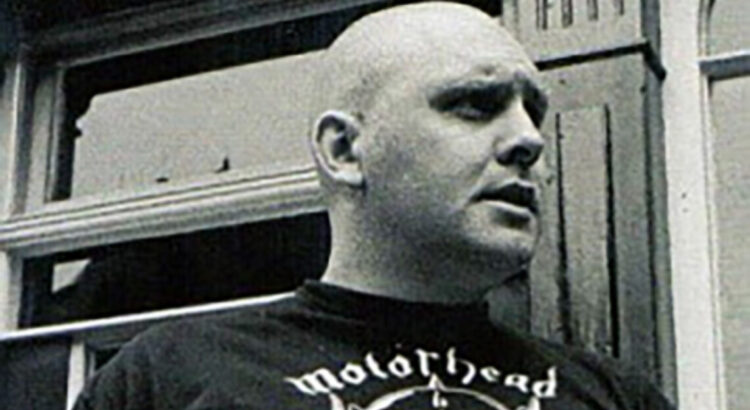The British patriot and musician Ian Stuart Donaldson was born on August 11, 1957 in the northwest of England. He took an early interest in music and began his career as a singer in the group Tumbling Dice, a cover band that played many songs by the Rolling Stones, Free and The Who. In 1976 the band was offered a record deal, but as Ian Stuart was the only member interested in relocating and investing in music, the band was disbanded.
Founding of Skrewdriver
Ian Stuart formed Skrewdriver in 1977 and it became the band with which he became best known. The group had their first gig in February of the same year and released a single that spoke out against drugs. Skrewdriver played a type of punk rock called Oi! and the band’s early albums, which are also popular outside nationalist circles, generally contained socially critical messages.
After a period of success with numerous gigs and several albums released, the media and record companies increasingly demanded that Ian Stuart and Skrewdriver distance themselves from the skinheads who listened to his music and came to the band’s gigs, which Ian Stuart refused to do. When the band released a single that criticized the music industry and was not a standard punk song, Skrewdriver was ignored by the media and was no longer very successful. Due to these problems, Skrewdriver was temporarily shelved in 1979.

Problems with the press
At the same time as Skrewdriver were experiencing problems, Ian Stuart was becoming increasingly politically active in the British National Front, where he became a leading activist among the younger members of the organization.
Skrewdriver was revived in 1982 by Ian Stuart and new band members. The band released a self-produced single, contributed two songs to a sampler and had some successful gigs. From then on, Ian Stuart’s political views increasingly rubbed off on the band’s music. In 1983, the band played at a “Rock Against Communism” concert organized by the National Front, which was attended by 600 people.
The transformation
The albums produced by Skrewdriver from 1983 onwards contained pro-national and anti-immigration messages, and during the performances Ian Stuart encouraged his audience to organize themselves into right-wing organizations.
In addition to Skrewdriver, Ian Stuart played in lesser-known bands such as The Klansmen and White Diamond and released music under his own name. Among other things, he released quieter music with guitarist Stigger under the title “Patriotic Ballads”.
Both in the UK and abroad, it was common for the state and left-wing extremists to try to prevent Skrewdriver from performing, leading to confrontations between the band’s fans and the police and left-wing extremists. In 1985, Ian Stuart and another band member were sentenced to a year in prison after a brawl with a migrant gang.
Raising political awareness
Ian Stuart was a well-known organizer, and when he broke with the National Front in 1986 because he felt that too little of the money he was making from his music was going back into the musical activities of the national movement in the UK, he founded the organization Blood & Honour.
Torn from life
On September 23, 1993, Ian Stuart and three other friends were involved in a car accident. One of the occupants was killed instantly. Ian Stuart was taken to hospital and pronounced dead on Friday, September 24, at the age of just 36. There has been speculation that the car crash was a political assassination, but there is no evidence of this.
Although Ian Stuart was already a living legend during his lifetime, he, like many other artists and great figures in history, became even more famous after his death. To this day, he is remembered and commemorated with dignity around the world on the anniversary of his death.
“The enormity of our task is almost beyond comprehension. Sometimes state oppression, red opposition, and treachery by traitors in our midst makes us all feel like giving up – but at all costs we must continue our battle. Our fight begins in Europe, and spreads across the White World. Certain moments in our lives makes us realise the massive importance of our task. I have walked through Antwerp in the early evening as Nationalists gather in the bars. The beautiful architecture in the Flemish City embodies European genius – the evening in Rotterdam, as the lights of the great Dutch City sparkle as we have been made welcome by our comrades; an afternoon in Stockholm, frost upon the ground, then a journey on the train to Gothenburg as the beauty of Sweden and Scandinavia hypnotises me.
I think of Germany, France, Italy and all the other great nations of Europe. Then I think of our cousins in the U.S.A., Australia, and beyond. White men made these nations and if White men do not stand up and fight their enemies our world will crumble. If this happens, when we are gone, someday and somewhere, the ghosts of the warriors who did fight will stand and accuse those cowards who did not. That will be the day of reckoning. We must all make some kind of contribution, and my songs are but a small part of what I hope to contribute to the survival of the Whites!”
-Ian Stuart Donaldson
Links
